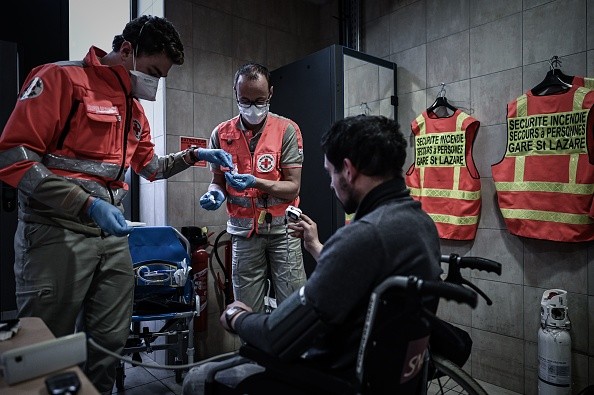This wearable device could detect oncoming epileptic seizures, which could issue a warning to patients before their unpredictable episodes occur, helping them avoid any accidents.

Red Cross volunteers take part in an intervention for a man (C) who suffered an epileptic seizure aboard a train, who suffered an epileptic seizure aboard a train, as part of the Red Cross operations to enforce the SAMU (French Urgent Medical Aid Service) at the Saint Lazare railway station on May 5, 2020, in the French capital Paris, during the lockdown in France aimed at curbing the spread of the COVID-19 disease, caused by the novel coronavirus.
Wearable Device Detects Epileptic Seizure
A group of researchers has successfully understood the patterns behind the seizure activities of epileptic patients through a wearable device.
The said wearable device is already out in the market to anyone who wants to get their hands on it. However, the algorithm that is supposed to predict seizures is unfortunately still in the works.
But its early result is already a promising development, the senior researcher of the study, an epilepsy scientist from the Mayo Clinic, Benjamin Brinkmann, revealed.
Epileptic Seizure Prediction Study
The findings, which could help patients who are left in the dark with their oncoming seizures, have been published in a recent journal on Nature.com.
The seizure forecasting study provides epileptic patients with a forecast that could span minutes or hours before it actually occurs.
The senior researcher of the study revealed to Heathday's report that they were" predicting about two-thirds of patients' seizures accurately," at least on an average.
Meanwhile, the chief medical officer of the Epilepsy Foundation, Jacqueline French, further noted that previous studies focusing on the trends on epilepsy already hinted in the past that seizure forecasting is not far from reality.
French, who is also a neurology professor from the New York University Langone School of Medicine, also added that some researchers are already working to understand the prevailing patterns of epileptic seizures in patients.
Thus, these researchers continue to prove that seizure activities are not random in nature contrary to the belief of some folks. Instead, there is a pattern behind it that is still waiting to be unveiled by further studies.
But still, despite the ongoing studies concerning the forecasting of seizure activities among patients, we have yet to access a non-invasive method of predicting such episodes.
What's more alarming, French even noted that one-third of epilepsy patients experience seizures that are out of their control.
Read Also: Apple Watches Are Helping A University Of Michigan Health Study Achieve Great Results
Wearable Device and Epileptic Seizure Prediction
Now, to further understand the pattern behind seizures among patients, the latest study published in Nature.com, asked its participants to wear a device for at least a year or six months.
The researchers also asked them to self-log their data on cloud storage on a daily basis.
Brinkmann, the senior researcher, said that the wearable device collects the same data the lie detector techs are also using, such as the heart rate, movement, temperature, and even blood flow.
He further disclosed that the team behind the study used the data from the wearable device to train an artificial intelligence algorithm, which could accurately provide seizure forecasts minutes or hours before.
Related Article: [LEAK] Meta is Developing Smartwatch With Front-Facing Camera | Can it Beat Apple Watch?
This article is owned by Tech Times
Written by Teejay Boris









